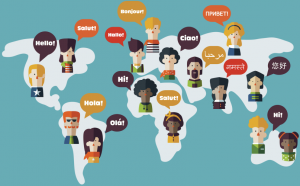Language: The Ultimate Brain Bender

It’s fascinating how our brain works to bend the language and use it to achieve certain purposes. However, what is intriguing is the thought that language itself can affect the human brain.

In the early 20th century, a philosophical theory arose known as the Sapir–Whorf hypothesis (also known as the linguistic relativity hypothesis), suggesting that one’s spoken language can profoundly impact their attitude and behavior. Some even argued about the existence of “classier” and “less classy” languages. A language that lacks class was perceived to be the main reason behind the idiocy and civilizational dealy of those who spoke it. People organized protests to eliminate the native Americans’ language, claiming it was what drove their barbaric behavior, and emphasizing the necessity to coerce them to learn the English language since it was a ‘classy’ one.
These claims seem very cruel and unfair and were faced with loads of criticism. Nonetheless, they can’t prevent us from begging the empirical question; Does our understanding and perception of the world shape our language? Or Does our language shape our understanding and perception of the world?
To crack the issue wide open, the behavioral researcher, Peter Gordon, conducted a unique study involving members of the Pirahã tribe, living in the Amazon Rainforest in Brazil.

The Pirahã’s counting system oddly consisted of three words, ‘one’, ‘two’, and ‘many’… This is fairly acceptable for a group of people who don’t have bank accounts, nor do they pay 10% tax or count population density.
Basically, Gordon designed a series of tasks to examine whether tribe members could precisely count and conceive numbers beyond one or two, even if their language lacked the words encoding them. For instance, in one of the tasks, Gordon put a total of 15 fish on the table and asked them to recreate the same number of fish before them.
Surprisingly, they couldn’t assume or mimic even approximately the fish number.

This led some scientists to believe a human can’t understand something that doesn’t have a specific word in their spoken language. So this little trick of number words here gives us a stepping stone into a whole cognitive realm some people are deprived of.
During another simple experiment, a group of people was shown a bunch of dispersed various pictures (natural elements, stationary…) and was asked to locate a specific one. It was found that those who kept repeating the element name within themselves, have found it faster than the others. As if our view is trapped within our language frame.
If I speak one language and you speak another, it’s highly possible that we process, understand, and judge things differently!

One of us may perceive it as ‘abortion‘ and the other as ‘the women’s right to choose‘ (Pro-Life/ Pro-Choice).
One of us may call it ‘Alternative Medicine‘ and the other may call it ‘Pseudoscience‘.
If I call it ‘A Fertilized Egg‘ and you refer to it as ‘An Unborn Child‘, we could see things radically different.
Perhaps the fact that each language can open the gate to a completely different world, is the reason why some people struggle to instantly switch to another language.
Sources:
- The theory of Linguistic Determinism: https://en.wikipedia.org/wiki/Linguistic_determinism
- The study of the Pirahã tribe: https://www.science.org/doi/full/10.1126/science.1094492
https://www.nature.com/news/2004/040816/full/news040816-10.html







